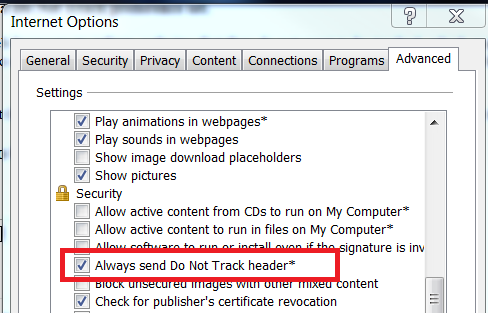Microsoft Backtracks On Default 'Do Not Track' Policy For Future Browser Versions
In a rather surprising, but not completely unexpected announcement today, Microsoft said that it has decided to stop enabling the "Do Not Track" feature by default in its future browser versions (which likely refers to Project Spartan).
A few years ago, Microsoft decided to enable the Do Not Track policy by default in Internet Explorer 10 as a competitive advantage over other browsers that left DNT off by default. However, the move quickly became controversial, especially because the ad industry didn't like it.
The ad industry's argument at the time was that Microsoft should leave the choice to users. Ad tracking can lead to increased revenue for ad networks and content publishers, so enabling DNT by default could have cost them a significant portion of their revenues.
However, the main reason that enabling DNT by default couldn't have possibly worked is because "not tracking" wasn't mandatory to ad networks. DNT has always been a policy that ad providers could either respect or not. Therefore, even if Microsoft enabled it by default in Internet Explorer, the ad networks could choose to ignore that request from IE users. A few years later, and now that the W3C has finalized its policies around DNT, Microsoft seems to see this too.
"Put simply, we are updating our approach to DNT to eliminate any misunderstanding about whether our chosen implementation will comply with the W3C standard. Without this change, websites that receive a DNT signal from the new browsers could argue that it doesn't reflect the users' preference, and therefore, choose not to honor it."
If users are left to choose on their own whether they want to be tracked or not, then the ad industry is much more likely to respect their decision. However, this may still work only as long as there aren't too many users who enabled DNT themselves. If over 50 percent of Internet users decided to enable DNT themselves, the ad networks may likely ignore the request anyway. Ultimately, all of this shows that DNT has never been a strong solution to stop ad tracking.
Users who want to actually stop being tracked by websites could use EFF's Privacy Badger (easiest to use), Disconnect, or Ghostery. These tools can disable all third-party tracking on the client's side, rather than waiting for the ad providers to agree to a "Do Not Track" request. They put the power in the users' hands, rather than in the hands of third party ad networks.
Get Tom's Hardware's best news and in-depth reviews, straight to your inbox.
Follow us @tomshardware, on Facebook and on Google+.
Lucian Armasu is a Contributing Writer for Tom's Hardware US. He covers software news and the issues surrounding privacy and security.
-
thundervore What Ads? Adblock Plus is all I need. It even removes commercials and annoying popups from Youtube and other streaming sitesReply -
Shin-san It's a shame to remove that setting, but yeah, ad companies are more likely to ignore it if it's set to "on" by defaultReply -
marraco I backtrack on Microsoft.Reply
Firefox+Chrome+no flash+ghostery.
I use Firefox for everything. If the crapware don't work, I use Chrome as backup.
Still running on Windows 7, and no plans to updowngrade to Win10. -
atavax So The NX isn't coming out 2015, they said there would be more information about the console next year, 2016. So probably not even the new console 2016, but 2017, which would mean 5 years, which isn't that bad. So 4 years after the PS4 and Xbone were launched, and the PS4 and Xbone were outdated at launch. I think it needs to be a solid upgrade to the PS4 and xbone.The PS4 and Xbone probably are going to last to 2018-2020? I don't see them lasting past 2020.Reply
The desktop market is shrinking. In the future, it seems like it will be only needed for gaming or professional use. The new Macbook has a tablet cpu, because efficiency is more important than raw performance with mobile devices and ARM is the king of efficiency and AMD is releasing an ARM desktop cpu in 2016.
I don't see the appeal of x86 for a console released in 2017, unless intel pays them a shit ton. Why would they adopt a dieing architecture that is less efficient if there is comparably powerful gaming cpu's using the same architecture used in almost every mobile device? -
canadianvice On what basis is win10 a downgrade? Bloody luddites. In a decade you'll be the same plague the XP users are now.Reply
One can argue 8 was worse than seven, but as far as previews are shaping up, w10 is set to be significant improvements on all fronts. -
Quixit Doesn't even slightly matter at all. The "Do Not Track" feature simply doesn't work. It's just a flag that requests the server not track you. NO ONE WHO ACTUALLY WRITES TRACKING CODE SUPPORTS IT SO IT DOES NOTHING.Reply -
Christopher1 ReplyI backtrack on Microsoft.
So, you don't want more performance for no cost? Since Windows 10 has been deemed to be EVEN LIGHTER ON SYSTEM RESOURCES than Windows 7 and 8?
Firefox+Chrome+no flash+ghostery.
I use Firefox for everything. If the crapware don't work, I use Chrome as backup.
Still running on Windows 7, and no plans to updowngrade to Win10.
